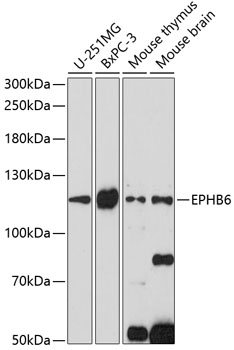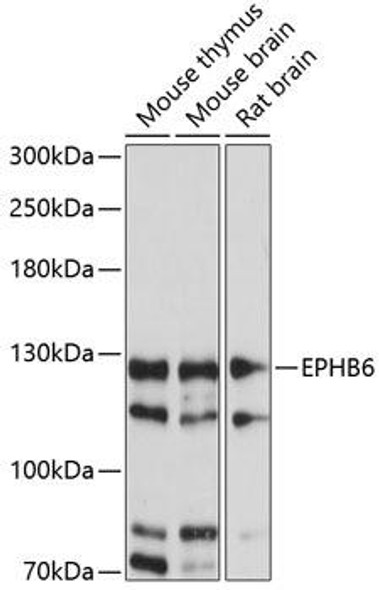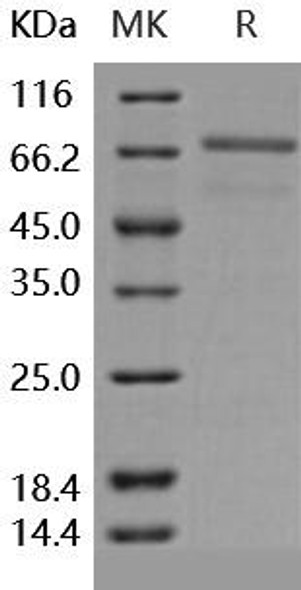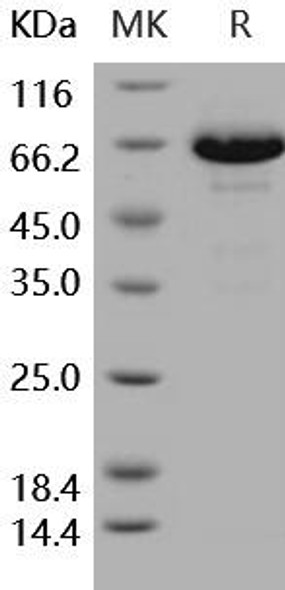Neuroscience
Anti-EPHB6 Antibody (CAB14728)
- SKU:
- CAB14728
- Product Type:
- Antibody
- Reactivity:
- Human
- Reactivity:
- Mouse
- Host Species:
- Rabbit
- Isotype:
- IgG
- Antibody Type:
- Polyclonal Antibody
- Research Area:
- Neuroscience
Description
| Antibody Name: | Anti-EPHB6 Antibody |
| Antibody SKU: | CAB14728 |
| Antibody Size: | 20uL, 50uL, 100uL |
| Application: | WB |
| Reactivity: | Human, Mouse |
| Host Species: | Rabbit |
| Immunogen: | Recombinant fusion protein containing a sequence corresponding to amino acids 615-729 of human EPHB6 (NP_001267724.2). |
| Application: | WB |
| Recommended Dilution: | WB 1:500 - 1:2000 |
| Reactivity: | Human, Mouse |
| Positive Samples: | U-251MG, BxPC-3, Mouse thymus, Mouse brain |
| Immunogen: | Recombinant fusion protein containing a sequence corresponding to amino acids 615-729 of human EPHB6 (NP_001267724.2). |
| Purification Method: | Affinity purification |
| Storage Buffer: | Store at -20'C. Avoid freeze / thaw cycles. Buffer: PBS with 0.02% sodium azide, 50% glycerol, pH7.3. |
| Isotype: | IgG |
| Sequence: | HFDQ LVAA FDKM IRKP DTLQ AGGD PGER PSQA LLTP VALD FPCL DSPQ AWLS AIGL ECYQ DNFS KFGL CTFS DVAQ LSLE DLPA LGIT LAGH QKKL LHHI QLLQ QHLR QQGS VEV |
| Gene ID: | 2051 |
| Uniprot: | O15197 |
| Cellular Location: | Membrane, Secreted, Single-pass type I membrane protein |
| Calculated MW: | 57kDa/81kDa/110kDa |
| Observed MW: | 111kDa |
| Synonyms: | EPHB6, HEP |
| Background: | This gene encodes a member of a family of transmembrane proteins that function as receptors for ephrin-B family proteins. Unlike other members of this family, the encoded protein does not contain a functional kinase domain. Activity of this protein can influence cell adhesion and migration. Expression of this gene is downregulated during tumor progression, suggesting that the protein may suppress tumor invasion and metastasis. Alternative splicing results in multiple transcript variants. |
| UniProt Protein Function: | EphB6: Kinase-defective receptor for members of the ephrin-B family. Binds to ephrin-B1 and ephrin-B2. Modulates cell adhesion and migration by exerting both positive and negative effects upon stimulation with ephrin-B2. Inhibits JNK activation, T-cell receptor-induced IL-2 secretion and CD25 expression upon stimulation with ephrin-B2. Belongs to the protein kinase superfamily. Tyr protein kinase family. Ephrin receptor subfamily. 3 isoforms of the human protein are produced by alternative splicing. |
| UniProt Protein Details: | Protein type:Protein kinase, TK; Membrane protein, integral; Protein kinase, tyrosine (receptor); Kinase, protein; EC 2.7.10.1; TK group; Eph family Chromosomal Location of Human Ortholog: 7q33-q35 Cellular Component: cytosol; extracellular region; plasma membrane Molecular Function:receptor activity Biological Process: ephrin receptor signaling pathway |
| NCBI Summary: | This gene encodes a member of a family of transmembrane proteins that function as receptors for ephrin-B family proteins. Unlike other members of this family, the encoded protein does not contain a functional kinase domain. Activity of this protein can influence cell adhesion and migration. Expression of this gene is downregulated during tumor progression, suggesting that the protein may suppress tumor invasion and metastasis. Alternative splicing results in multiple transcript variants. [provided by RefSeq, Jul 2013] |
| UniProt Code: | O15197 |
| NCBI GenInfo Identifier: | 294862532 |
| NCBI Gene ID: | 2051 |
| NCBI Accession: | O15197.4 |
| UniProt Secondary Accession: | O15197,Q2TB23, Q2TB24, A4D2I7, A8CDT5, D3DXD3, |
| UniProt Related Accession: | O15197 |
| Molecular Weight: | 57,498 Da |
| NCBI Full Name: | Ephrin type-B receptor 6 |
| NCBI Synonym Full Names: | EPH receptor B6 |
| NCBI Official Symbol: | EPHB6 |
| NCBI Official Synonym Symbols: | HEP |
| NCBI Protein Information: | ephrin type-B receptor 6 |
| UniProt Protein Name: | Ephrin type-B receptor 6 |
| UniProt Synonym Protein Names: | HEP; Tyrosine-protein kinase-defective receptor EPH-6 |
| Protein Family: | Ephrin type-B receptor |
| UniProt Gene Name: | EPHB6 |
| UniProt Entry Name: | EPHB6_HUMAN |
View AllClose







